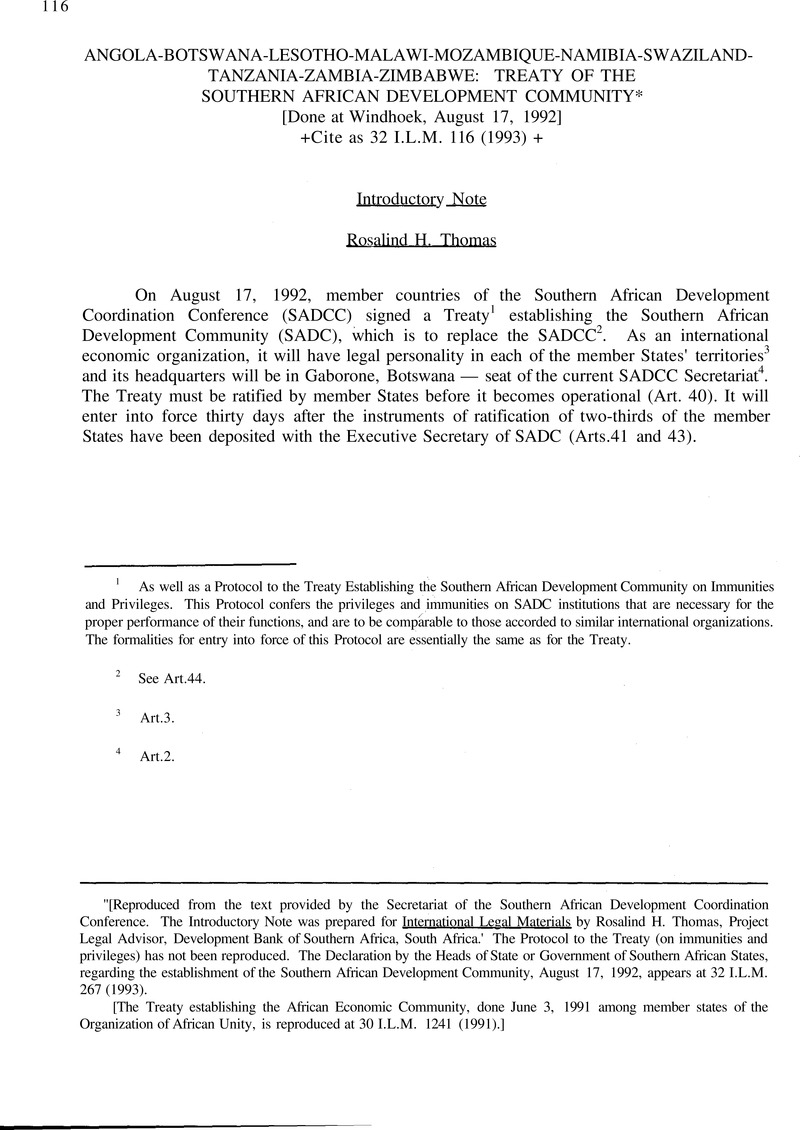Published online by Cambridge University Press: 27 February 2017

* “[Reproduced from the text provided by the Secretariat of the Southern African Development Coordination Conference. The Introductory Note was prepared for International Legal Materials by Rosalind H. Thomas, Project Legal Advisor, Development Bank of Southern Africa, South Africa.’ The Protocol to the Treaty (on immunities and privileges) has not been reproduced. The Declaration by the Heads of State or Government of Southern African States, regarding the establishment of the Southern African Development Community, August 17, 1992, appears at 32 I.L.M. 267 (1993).
[The Treaty establishing the African Economic Community, done June 3, 1991 among member states of the Organization of African Unity, is reproduced at 30 I.L.M. 1241 (1991).]
1 As well as a Protocol to the Treaty Establishing the Southern African Development Community on Immunities and Privileges. This Protocol confers the privileges and immunities on SADC institutions that are necessary for the proper performance of their functions, and are to be comparable to those accorded to similar international organizations. The formalities for entry into force of this Protocol are essentially the same as for the Treaty.
2 See Art.44.
3 Art.3.
4 Art.2.
5 Angola, Botswana, Lesotho, Malawi, Mozambique, Swaziland, Tanzania, Zambia and Zimbabwe.
6 Thus the rapprochement reached in Angola between UNTTA and the MPLA, the peace talks being brokered between Renamo and Frelimo in Mozambique, and movements in the rest of Southern Africa towards more democratic government, have contributed towards a positive view of the economic gains to be achieved by integration.
7 The end of the Cold War and the collapse of the centrally-planned economies of Eastern Europe and the former Soviet Union.
8 Including the argument that political change in South Africa is likely to lead to new patterns of investment in the region, with marked preference for South Africa because of its more attractive investment climate, infrastructural Development, and its managerial, technical and technotogical capacities. A further argument tooks to Developments in the advanced industrialist countries, as well as in the Pacific Rim and Latin America where these countries are entering into protectionist trading btocs constructed of free trade zones. This has made integration even more crucial to enable the countries of the region to strengthen their bargaining power with these trading btocs.
9 A function that the current SADCC Secretariat lacks, thereby weakening its ability to foltow through on policies and strategies adopted by the member States.
10 The details concerning, inter alia, the powers, functions and procedures of the Tribunal, are to be dealt with in a protocol (Art 16.2).
11 It is anticipated that several commissions will be constituted on a sectoral basis and dealt with in separate protocols. The commissions are to work ctosely with the Secretariat but will be answerable to the Council.
12 Headed by an Executive Secretary. The current Executive Secretary is Dr Simba Makoni from Zimbabwe.